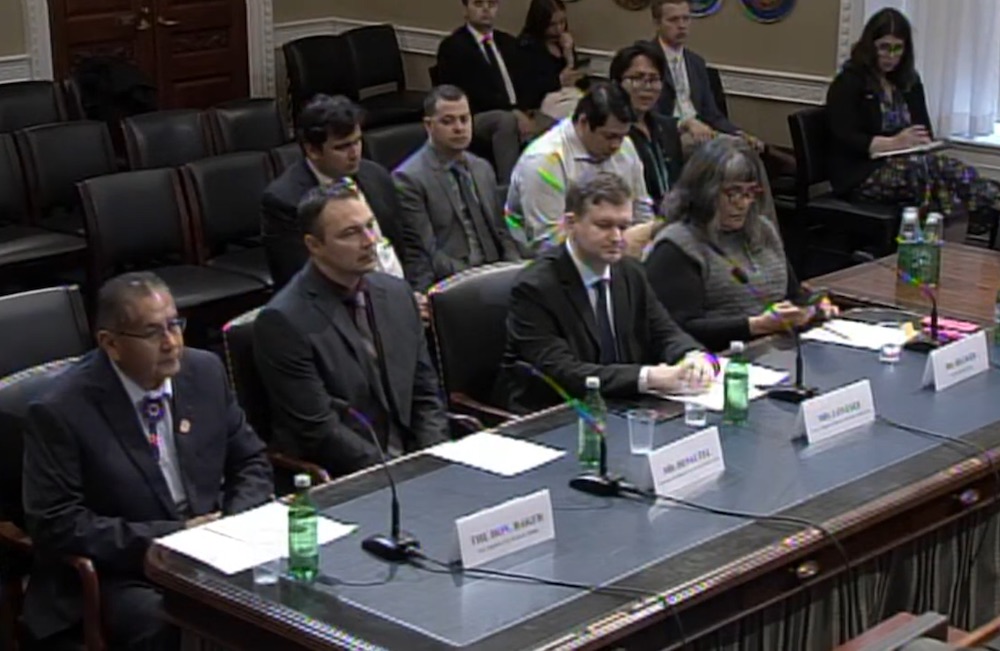
- Details
- By Chez Oxendine
- Energy | Environment
With a potential government shutdown looming, a House subcommittee held a hearing on Thursday to discuss tribal autonomy in energy agreements, with witnesses expressing frustration with arcane and potentially dangerous regulations that have prevented tribes from fully exercising their self-determination rights.
The oversight hearing on Tribal Autonomy and Energy Development was hosted by the Natural Resources Committee’s Indian and Insular Affairs Subcommittee.
While a common thread of frustration with ill-defined energy regulations ran through testimonies, tribal witnesses voiced a wide range of other concerns regarding existing legislation and how best to respect tribal sovereignty in energy dealings.
The subcommittee heard from Melvin J. Baker, chairman of the Southern Ute Indian Tribal Council; Cody Desautel, executive director for the Confederated Tribes of the Colville Reservation; Bidtah N. Becker, legal counsel for the Navajo Nation Office of the President and Vice-President; and Nicholas Lovesee, director of policy for the Native American Finance Officers Association (NAFOA).
The hearing focused on the implementation of the 2018 Indian Tribal Energy Development and Self Determination Act, which sought to amend a 2005 law granting tribes the right to establish Tribal Energy Resource Agreements, or TERAs. These agreements allow tribes to obtain prior approval from the Department of Interior to conduct their own energy agreements directly with potential partners.
So far, no tribe has employed a TERA, according to Harriet Hagerman (R-Wyo.), chair of the subcommittee.
“To this date, no tribe has entered into a TERA,” Hagerman told the committee and attended witnesses. “...tribes have more questions than answers about these regulations.”
While individual witnesses brought specific qualms to the table, the general consensus was that TERA arrangements had been ignored because the regulations are arcane and potentially dangerous for many tribes.
In particular, Baker said too much power would remain with the Bureau of Indian Affairs even after a TERA was in place. His tribe’s specific complaint lay with wording in the existing regulation that granted the Department of the Interior “inherently Federal functions” that haven’t, to Baker’s knowledge, been defined.
“Despite repeated efforts to get meaningful clarification from the Interior Department as to what that exception means, we have been unable to do so,” Baker told the House members. “Our Tribe and all energy-producing Tribes are still waiting for that promised clarification just as we have been waiting since 2008.”
Desaultel discussed his tribes’ biomass demonstration project, originally authorized in the same 2018 act that created TERAs. These demonstration projects would utilize biomass from sustainably harvested timber and other materials to generate electricity and remove carbon dioxide from the atmosphere, combating climate change.
The authorizing act, however, failed to give federal agencies time to enter into agreements with tribes to create the requisite biomass projects, leaving the status of those proposed projects in question, Desaultel said.
“The Colville Tribes urges the Committee to update the dates in the Project to enable Indian tribes to utilize the authority,” Desaultel said. “The biomass demonstration project remains a viable tool for energy projects.”
Lovesee testified that tribes are in a “holding pattern” as they wait for the federal government to provide clarity on several aspects of the programs. He told the committee that the Inflation Reduction Act had gone a long way towards supporting tribal efforts in the energy sector — such as establishing direct pay tax credits for solar projects and offering direct loans from the Department of Energy. However, more work was needed to fine tune these solutions and make them more attractive to potential partners in the industry.
“Without guidance from the Treasury and IRS, no one is really sure what to make of these Direct Pay provisions for tribes, how they would be implemented, and what they would actually mean in practical terms,” Lovesee said. “For almost a year now we’ve seen this holding pattern and while the Treasury has released some guidance, there are still key questions outstanding and many of the tribes and developers that I’ve spoken with are hesitant about what the landscape will look like going forward.”
Becker cited Navajo Nation’s issues with ownership and development throughout the years. In addition to ensuring that particular data from the Department of the Interior would be available regardless of who ultimately took ownership of a project, Becker said the Navajo Nation suggested expanding which agencies can interface directly with tribes.
“The Navajo Nation could benefit greatly from expertise and more expansive technical assistance within the Department of Energy,” Becker said. “One of the things the Subcommittee could consider is granting several federal departments and agencies the discretion to work with Native nations.”
